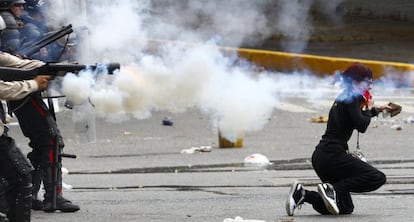Unasur mission hopes to initiate Venezuela peace talks
Jailed opposition leader López claims charges filed against him are part of Maduro’s persecution

A group of foreign ministers from the Union of South American Nations (Unasur) was expected to arrive in Caracas on Monday to try to initiate a peace dialogue between President Nicolás Maduro and sectors of the opposition, which have been holding anti-government protests for the past two months.
The unrest reached a new climax on Saturday after the government announced that it would file four felony charges against jailed opposition leader Leopoldo López in relation to the riots and disturbances that began on February 12, including criminal association and vandalism. Thousands of López's supporters rallied in the streets while students and other groups battled police in Caracas and other cities.
With these charges, it seems unlikely that López, a former mayor of the Caracas district of Chacao, will be granted bail. He has been held at the Ramo Verde military prison since February 18.
Besides López, other members of the opposition, including the former mayors of the cities of San Cristóbal and San Diego, have been removed from office and sent to prison for failing to follow Maduro government orders to remove street barricades.
María Corina Machado, one of López’s allies, was ousted from her seat in the National Assembly after the Supreme Court ruled that she violated the law by joining the Panamanian delegation at the Organization of American States (OAS) to try to speak about the social and economic crisis facing her country. She was ultimately prevented from taking the floor on March 21 by Venezuela’s leftist allies.
Machado is also facing a criminal investigation by the Attorney General’s Office.
Over the weekend President Maduro reiterated accusations that many opposition leaders are trying to organize a coup against his government.
Venezuela offers one of the crudest examples in the region of a lack of judicial independence ”
According to Human Rights Watch (HRW), the court system has been packed with a pro-government judiciary since the late President Hugo Chávez reformed the judicial system in 2004. José Miguel Vivanco, HRW director for the Americas, said the Supreme Court has become “an appendage of the executive.”
“Venezuela is one of the crudest examples in the region where a lack of judicial independence exists,” he said.
Ahead of the arrival of the Unasur delegation, Venezuelan Foreign Minister Elías Jaua said Monday that his counterparts from the region were “going to support, promote and assist in the dialogue within the framework” of the National Peace Conference, which Maduro announced last week he was organizing, in an effort “to end this wave of extreme violence, which has caused the people lots of pain and suffering.”
Among the demands the opposition has put forward before it will sit down at the negotiating table is for López to be released from prison.
In a column published in EL PAÍS on Sunday, López said he was innocent of the charges filed against him. “I am sure that my presence here in Ramo Verde has nothing to do with what occurred on [February 12] but instead is the result of a massive persecution against me by a regime that is intolerant, repressive and corrupt. Since January 2013, President Maduro has been threatening to throw me in prison and he was very adamant about this throughout the year.”
López, Machado and former presidential candidate Henrique Capriles, who ran against Chávez and Maduro in the last two elections, all lead their own factions but have united under the United Democratic Panel (MUD), the umbrella group that groups all opposition forces in the country.
Meanwhile, the wave of violence, including clashes with riot police and the setting up of street barricades, appears far from ending soon. On Sunday morning, protestors took to the streets again in east Caracas where anti-government demonstrators set up road blocks and battled squads of riot police, which fired rubber bullets and tear gas. The confrontations lasted for more than six hours and ended with scores of people injured and at least 15 arrests.
A former aide to an opposition mayor and a friend of López were both found shot
But the day ended with shocking news for two important families in Venezuela. A former aide to an opposition mayor – who was a member of one of Venezuela’s wealthiest families – and a childhood friend of López were both found dead at a national park, shot in the back of their heads.
The bodies of Gustavo Giménez, 40, and Luis Daniel Gómez, 36, were recovered at Ávila National Park, a sprawling lush mountain area that separates Caracas from the Caribbean.
Giménez was an aide to Carlos Ocariz, an opposition mayor who serves in the Caracas municipality of Sucre. The dead man was also first cousin to Lorenzo Mendoza, the chairman of the country’s largest food and beverage company, Polar.
Gómez had grown up with López and was a close friend. The families of both men reported that they disappeared on Saturday and their kidnappers had demanded ransoms in exchange for their release.
Tu suscripción se está usando en otro dispositivo
¿Quieres añadir otro usuario a tu suscripción?
Si continúas leyendo en este dispositivo, no se podrá leer en el otro.
FlechaTu suscripción se está usando en otro dispositivo y solo puedes acceder a EL PAÍS desde un dispositivo a la vez.
Si quieres compartir tu cuenta, cambia tu suscripción a la modalidad Premium, así podrás añadir otro usuario. Cada uno accederá con su propia cuenta de email, lo que os permitirá personalizar vuestra experiencia en EL PAÍS.
En el caso de no saber quién está usando tu cuenta, te recomendamos cambiar tu contraseña aquí.
Si decides continuar compartiendo tu cuenta, este mensaje se mostrará en tu dispositivo y en el de la otra persona que está usando tu cuenta de forma indefinida, afectando a tu experiencia de lectura. Puedes consultar aquí los términos y condiciones de la suscripción digital.








































